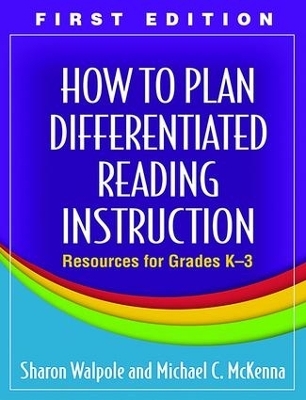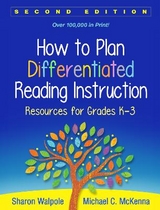
How to Plan Differentiated Reading Instruction, First Edition
Guilford Publications (Verlag)
978-1-60623-264-4 (ISBN)
- Titel erscheint in neuer Auflage
- Artikel merken
Offering step-by-step guidance to simplify planning and decision making, this book reviews the basics of differentiated reading instruction and provides detailed, ready-to-use lesson plans and materials to help teachers hit the ground running. Teachers get everything they need to implement four types of instructional groups over multiple three-week cycles. For fluency, vocabulary, and comprehension, lessons are based on popular, inexpensive trade books. For phonemic awareness and word recognition, dozens of reproducibles are provided, all in a convenient large-size format. The book can be used on its own or as a complement to Differentiated Reading Instruction: Strategies for the Primary Grades, which offers a complete introduction to the authors' approach.
Sharon Walpole, PhD, is Professor in the School of Education at the University of Delaware. She has extensive school-based experience designing and implementing tiered instructional programs. Dr. Walpole has also been involved in federally funded and other schoolwide reform projects. Her current work involves the design and effects of schoolwide reforms, particularly those involving literacy coaches. She has coauthored or coedited several other books with Michael C. McKenna, including How to Plan Differentiated Reading Instruction: Resources for Grades K-3 and The Literacy Coach's Handbook, Second Edition, and she is coauthor of The Building Blocks of Preschool Success with Katherine A. Beauchat and Katrin L. Blamey. Dr. Walpole is a recipient of the Early Career Award for Significant Contributions to Literacy Research and Education from the Literacy Research Association. Michael C. McKenna, PhD, was Thomas G. Jewell Professor of Reading in the Curry School of Education at the University of Virginia until his death in 2016. He authored, coauthored, or edited more than 20 books, including Assessment for Reading Instruction, Third Edition; How to Plan Differentiated Reading Instruction, Second Edition: Resources for Grades K–3; and Organizing the Early Literacy Classroom; as well as over 100 articles, chapters, and technical reports on a range of literacy topics. Dr. McKenna also served as Series Editor, with Sharon Walpole, of The Essential Library of PreK–2 Literacy. His research was sponsored by the National Reading Research Center and the Center for the Improvement of Early Reading Achievement. He was a corecipient of the Edward B. Fry Book Award from the Literacy Research Association and the Award for Outstanding Academic Books from the American Library Association, and a member of the Reading Hall of Fame.
1. What Do We Mean by Differentiated Reading Instruction?
2. Using Assessments to Plan Differentiated Reading Instruction
3. Targeting Phonological Awareness and Word Recognition
4. Targeting Word Recognition and Fluency
5. Targeting Fluency and Comprehension
6. Targeting Vocabulary and Comprehension
7. Making Differentiation Schoolwide
| Erscheint lt. Verlag | 30.6.2009 |
|---|---|
| Reihe/Serie | Solving Problems in the Teaching of Literacy |
| Verlagsort | New York |
| Sprache | englisch |
| Gewicht | 409 g |
| Themenwelt | Schulbuch / Wörterbuch |
| Sozialwissenschaften ► Pädagogik ► Schulpädagogik / Grundschule | |
| ISBN-10 | 1-60623-264-9 / 1606232649 |
| ISBN-13 | 978-1-60623-264-4 / 9781606232644 |
| Zustand | Neuware |
| Haben Sie eine Frage zum Produkt? |
aus dem Bereich



